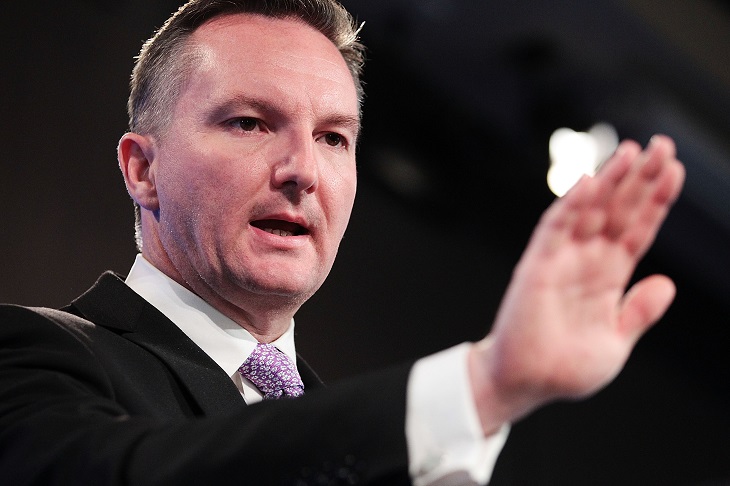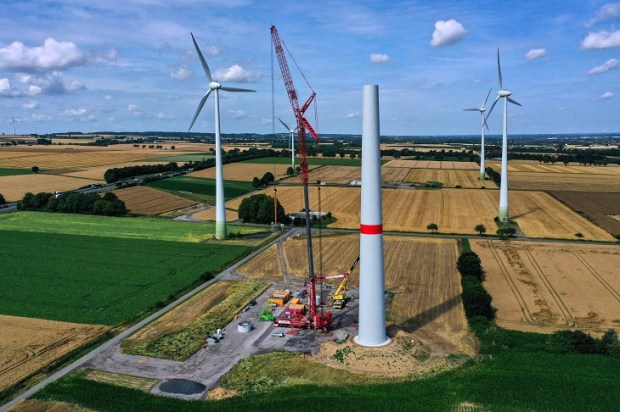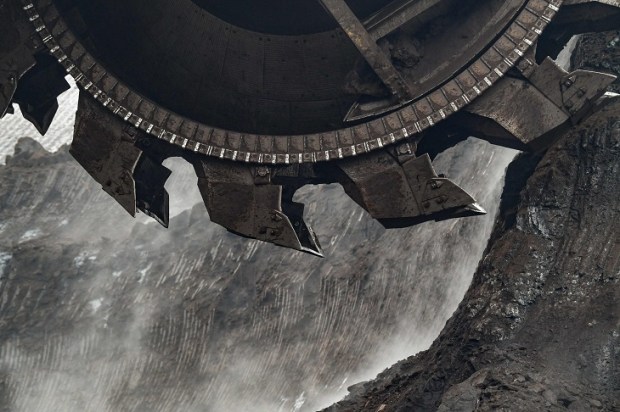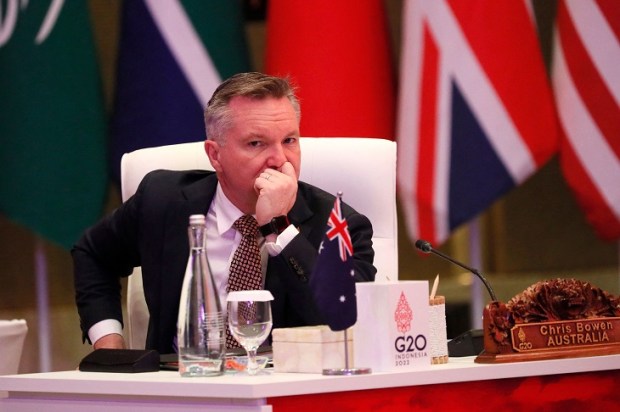Chris Bowen is a man on the brink. He is under extreme pressure to meet improbable targets for renewable expansion and emission reductions. A man under this kind of pressure must react, so what can he do? In conjunction with the Greens, the government has already legislated deeper emissions reduction targets across the economy – 43 per cent below 2005 by 2030 – making Australia one of only five countries to deepen its emissions reduction pledge since 2022.
Add to that a supersized safeguard mechanism imposing a carbon tax on our biggest industries; a raft of subsidies trotted out to electric vehicles and hydrogen; the CEFC receiving a $20 billion boost to spend on transmission projects; a new Net Zero bureaucracy; and signing up to the German-inspired Climate Club. One hopes that cubby house has central heating.
It is nauseating to think that Mr Bowen took the reins as Federal Energy Minister just over 12 months ago. The only person performing worse than the hapless Climate and Energy Minister is his energy adviser. Look at the record retail electricity prices, just one of many concerning trends in Australian electricity and energy policy.
However, Mr Bowen and his adviser are not alone in their failure. If they are acting on the advice of the energy bureaucracies – AEMO, AER, AEMC, ESB, CSIRO – and the results are this bad, the heads of all these bureaucracies must go. If Mr Bowen is acting alone, then they still all must go, because there is no excuse for allowing the government of the day to destroy our critical energy systems unchallenged. The same must be said of state ministers and their advisers.
Consider the daily activities of our Federal Energy Minister — who does he talk to and what does he read to come up with these ideas?
One clue is the 150 official media releases from Mr Bowen’s office since June 2022, of which 131 (87 per cent) are announcing either subsidies or advocacy for the renewable energy sector.
How is the renewable industry’s wish list so often becoming real policy?
And what’s next on their agenda?
From public statements made by the renewables industry, it appears the public are being softened up in preparation for an announcement expanding the Renewable Energy Target (RET).
July 2023, Clean Energy Council’s Kane Thornton:
No policy has delivered as much abatement, given as much certainty and unlocked as much investment as the RET. Extending it beyond 2030 would be simple and fast, and the benefits to energy prices and the Australian economy will outweigh the costs associated with this extension. These are the actions and leadership we now need to turn ambition into reality and ensure we are set up to achieve 82 per cent renewable energy by 2030.
July 2023, Ross Garnaut:
We’ve got the capital, the tech, the people. Now we need the policy environment. One missing bit is a general incentive, such as extending and strengthening the Renewable Energy Target. We can get there.
June 2023, the Guardian’s Adam Morton:
Two steps could help address the problem. The first is to expand and extend the national renewable energy target. The target was filled in 2019 and will stop offering support for existing solar and windfarms by 2030. Solar and wind can compete and will continue to be built without it, just not fast enough. It would be relatively uncomplicated to reset it to give the system the big push that it needs.
May 2023, Renew Economy:
Extend the RET: Wind industry giants call for reboot of federal renewables incentive.
April 2023, International Energy Agency:
Support co-ordination for greater alignment of national, state and territory policies, incentives and investments to achieve the targets and standards, to ensure proper planning and preparation for the retirement of coal generation.
A theme is emerging, and I believe we can expect an official announcement from Mr Bowen this year, extending the RET far beyond 2030. What choice does he have? The slim chances of a triumphant parade through Davos can only be realised by sacrificing Australia’s prosperity on the Net Zero altar.
He cannot afford to acknowledge the compromise of nuclear power, despite other countries revitalising their nuclear programs. He must ignore the protests of businesses labouring under ever-greater energy costs. He dare not concede to the rapidly mobilising armies of farmers and communities pushing back against the forced industrialisation of their quiet countrysides.
Instead, he must adhere to the dogma that ‘renewables are the cheapest form of energy’; that ‘nuclear is too slow, too expensive’; and that ‘coal is too unreliable’. Despite his best efforts, Mr Bowen is on the verge of embarrassing failure.
There is only one way to turn this around. The Opposition under Peter Dutton must come out ahead of an announcement on the RET and make it clear that the existing RET is why we are in this mess to begin with. Additionally, an incoming LNP government needs to repeal the RET legislation in its entirety; along with scrapping the safeguard mechanism, EV subsidies, new transmission line projects, and all but the barest hydrogen funding. Then the real work can begin.
Got something to add? Join the discussion and comment below.
Get 10 issues for just $10
Subscribe to The Spectator Australia today for the next 10 magazine issues, plus full online access, for just $10.


























Comments
Don't miss out
Join the conversation with other Spectator Australia readers. Subscribe to leave a comment.
SUBSCRIBEAlready a subscriber? Log in